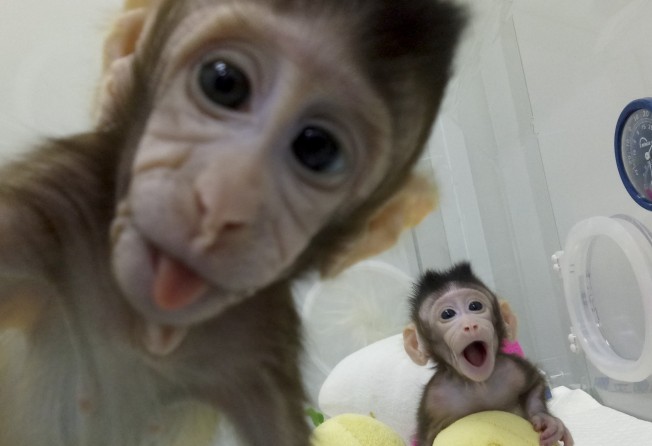The practical benefits of cloning monkeys
Chinese scientists have succeeded in cloning primates but the idea that humans may be next is fanciful; the aim is curing diseases, not bringing loved ones back to life

The breakthrough by Chinese scientists in cloning monkeys was bound to lead to a question: are humans next? Images of the two macaques, wide-eyed and long-legged, cute and vulnerable in the same way as a baby, gave the impression of that moment being close.
But while the team at the Chinese Academy of Sciences’ institute of neuroscience believed that in principle, it would be possible using the same technique, that was not the aim.
In keeping with Beijing’s goal of China becoming a research powerhouse and meeting social challenges, the focus is on curing diseases.
Monkeys, because of their genetic similarities to humans, are an integral part of scientific research into brain diseases, cancers and other afflictions.
Tens of thousands are taken from the wild each year to the world’s laboratories for experiments. The benefits of creating large numbers of animals with particular genetic conditions for research so that treatments can be produced is worthy. The macaque twins, named Hua Hua and Zhong Zhong, are the first of a number of clones expected to be born in coming months.
Some people looking at China from the outside may find that goal hard to believe. There is a sense that anything is possible for the nation, the growing catalogue of achievements in fields from engineering to chemical products to semiconductor design to medicine and artificial intelligence showing what dedication, determination and billions of dollars in investment can attain.
The latest landmark, realised by adapting the techniques used by British scientists in cloning the first mammal, Dolly the sheep, in 1996, only proves the point.
But as much as fans of science fiction or those who ache for the return of a loved one relish the idea, such a possibility is not as near as it seems. While such work is not banned in China, it is in many Western countries and the scientists involved were only too aware of the ethical concerns. Dozens of failed attempts over three years proved the inefficiencies of cloning primates with the method and the risks involved. They understandably want to instead use their know-how, energies and resources for practical rather than fanciful reasons.